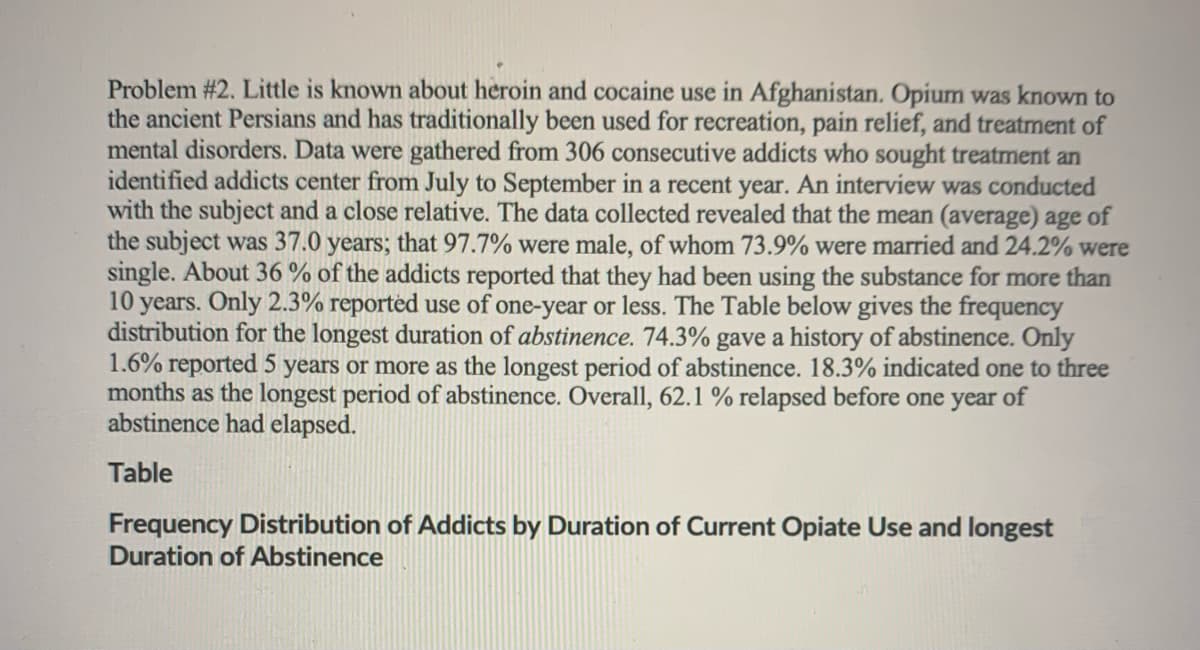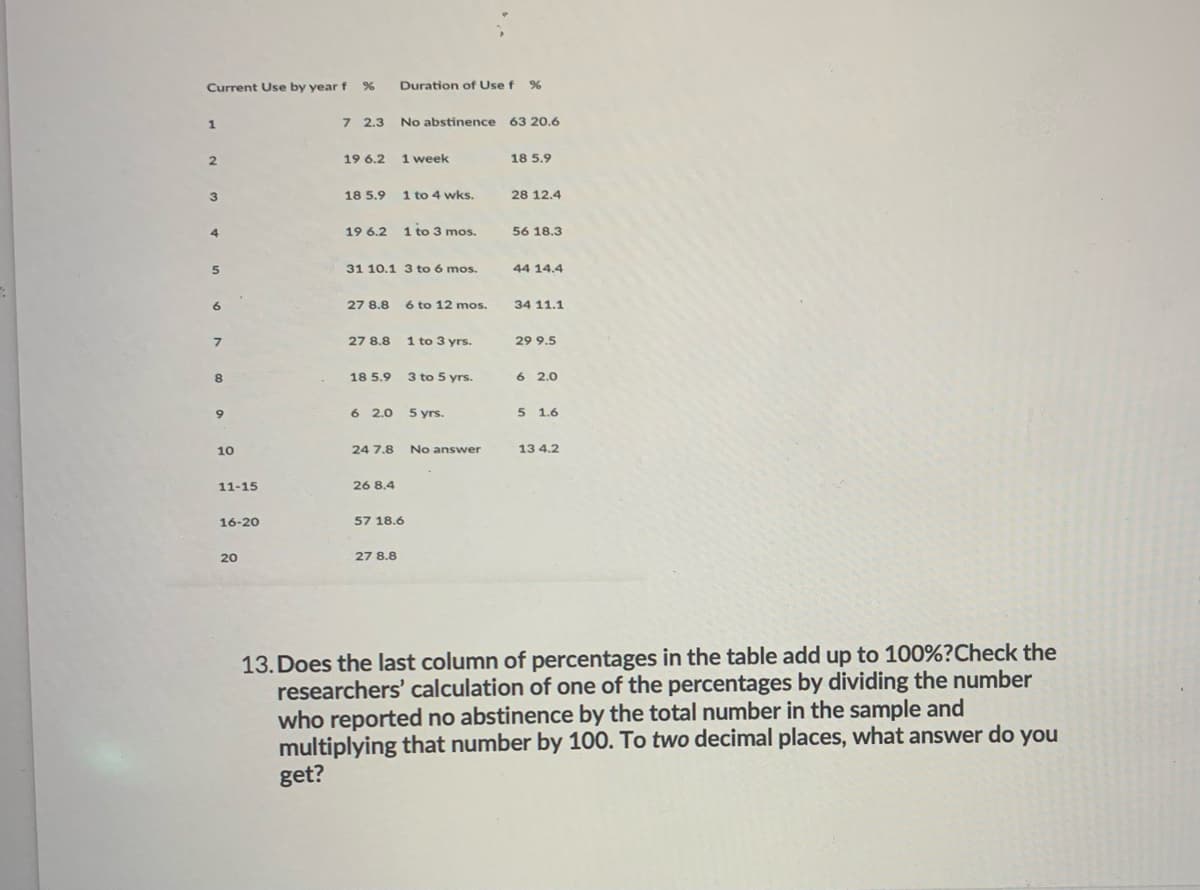13. Does the last column of percentages in the table add up to 100%?Check the researchers' calculation of one of the percentages by dividing the number who reported no abstinence by the total number in the sample and multiplying that number by 100. To two decimal places, what answer do you get?
13. Does the last column of percentages in the table add up to 100%?Check the researchers' calculation of one of the percentages by dividing the number who reported no abstinence by the total number in the sample and multiplying that number by 100. To two decimal places, what answer do you get?
MATLAB: An Introduction with Applications
6th Edition
ISBN:9781119256830
Author:Amos Gilat
Publisher:Amos Gilat
Chapter1: Starting With Matlab
Section: Chapter Questions
Problem 1P
Related questions
Question

Transcribed Image Text:Problem #2. Little is known about heroin and cocaine use in Afghanistan. Opium was known to
the ancient Persians and has traditionally been used for recreation, pain relief, and treatment of
mental disorders. Data were gathered from 306 consecutive addicts who sought treatment an
identified addicts center from July to September in a recent year. An interview was conducted
with the subject and a close relative. The data collected revealed that the mean (average) age of
the subject was 37.0 years; that 97.7% were male, of whom 73.9% were married and 24.2% were
single. About 36 % of the addicts reported that they had been using the substance for more than
10 years. Only 2.3% reported use of one-year or less. The Table below gives the frequency
distribution for the longest duration of abstinence. 74.3% gave a history of abstinence. Only
1.6% reported 5 years or more as the longest period of abstinence. 18.3% indicated one to three
months as the longest period of abstinence. Overall, 62.1 % relapsed before one year of
abstinence had elapsed.
Table
Frequency Distribution of Addicts by Duration of Current Opiate Use and longest
Duration of Abstinence

Transcribed Image Text:Current Use by year f
Duration of Use f %
1.
7 2.3 No abstinence 63 20.6
19 6.2
1 week
18 5.9
3
18 5.9
1 to 4 wks.
28 12.4
19 6.2
1 to 3 mos.
56 18.3
4.
5.
31 10.1 3 to 6 mos.
44 14.4
6.
27 8.8
6 to 12 mos.
34 11.1
27 8.8
1 to 3 yrs.
29 9.5
18 5.9
3 to 5 yrs.
6 2.0
6 2.0 5 yrs.
5 1.6
10
24 7.8
No answer
13 4.2
11-15
26 8.4
16-20
57 18.6
20
27 8.8
13. Does the last column of percentages in the table add up to 100%?Check the
researchers' calculation of one of the percentages by dividing the number
who reported no abstinence by the total number in the sample and
multiplying that number by 100. To two decimal places, what answer do you
get?
Expert Solution
This question has been solved!
Explore an expertly crafted, step-by-step solution for a thorough understanding of key concepts.
Step by step
Solved in 3 steps with 2 images

Recommended textbooks for you

MATLAB: An Introduction with Applications
Statistics
ISBN:
9781119256830
Author:
Amos Gilat
Publisher:
John Wiley & Sons Inc

Probability and Statistics for Engineering and th…
Statistics
ISBN:
9781305251809
Author:
Jay L. Devore
Publisher:
Cengage Learning

Statistics for The Behavioral Sciences (MindTap C…
Statistics
ISBN:
9781305504912
Author:
Frederick J Gravetter, Larry B. Wallnau
Publisher:
Cengage Learning

MATLAB: An Introduction with Applications
Statistics
ISBN:
9781119256830
Author:
Amos Gilat
Publisher:
John Wiley & Sons Inc

Probability and Statistics for Engineering and th…
Statistics
ISBN:
9781305251809
Author:
Jay L. Devore
Publisher:
Cengage Learning

Statistics for The Behavioral Sciences (MindTap C…
Statistics
ISBN:
9781305504912
Author:
Frederick J Gravetter, Larry B. Wallnau
Publisher:
Cengage Learning

Elementary Statistics: Picturing the World (7th E…
Statistics
ISBN:
9780134683416
Author:
Ron Larson, Betsy Farber
Publisher:
PEARSON

The Basic Practice of Statistics
Statistics
ISBN:
9781319042578
Author:
David S. Moore, William I. Notz, Michael A. Fligner
Publisher:
W. H. Freeman

Introduction to the Practice of Statistics
Statistics
ISBN:
9781319013387
Author:
David S. Moore, George P. McCabe, Bruce A. Craig
Publisher:
W. H. Freeman